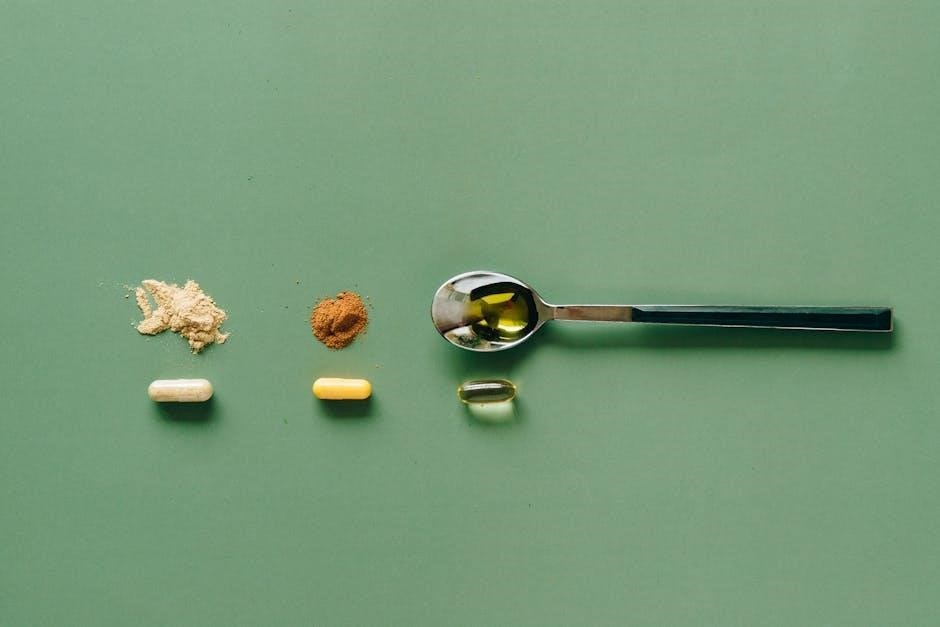The Cortisol Detox Diet is a structured plan designed to help manage cortisol levels naturally․ It focuses on reducing stress hormones through nutrient-rich foods, supporting adrenal health, and promoting overall well-being․ The diet offers a 21-day meal plan, emphasizing whole foods, healthy fats, and lean proteins to balance cortisol and improve energy, weight management, and mental clarity․
1․1 What is Cortisol and Why is it Important?
Cortisol is the body’s primary stress hormone, produced by the adrenal glands․ It plays a crucial role in various bodily functions, including metabolism, immune response, and blood sugar regulation․ Cortisol levels typically fluctuate throughout the day, peaking in the morning and decreasing at night․ While cortisol is essential for responding to stress and maintaining energy, chronically elevated levels can lead to health issues like weight gain, sleep disturbances, and mood swings․ Balancing cortisol is vital for overall well-being, which is why dietary and lifestyle strategies, such as the cortisol detox diet, are increasingly popular for managing stress and promoting hormonal equilibrium․
1․2 The Link Between Cortisol and Diet
Diet plays a significant role in cortisol regulation, as certain foods can either increase or decrease cortisol levels․ Foods high in sugar, refined carbohydrates, and unhealthy fats can trigger cortisol spikes, while nutrient-dense foods like leafy greens, berries, and fatty fish help lower cortisol․ Omega-3 fatty acids, fiber, and antioxidants are particularly beneficial for balancing stress hormones․ A diet rich in whole foods supports adrenal health and promotes stable blood sugar levels, reducing the need for cortisol surges․ By focusing on balanced macronutrients and avoiding processed foods, individuals can better manage cortisol levels and reduce the negative effects of chronic stress․ This connection highlights the importance of diet in maintaining hormonal equilibrium and overall well-being․
Understanding Cortisol and Its Effects
Cortisol, the body’s primary stress hormone, plays a crucial role in responding to stress, regulating metabolism, and maintaining blood sugar levels․ Chronically elevated cortisol levels can lead to weight gain, mood swings, and sleep disturbances, highlighting the importance of managing cortisol for overall health and well-being․
2․1 The Role of Cortisol in the Body
Cortisol is the body’s primary stress hormone, produced by the adrenal glands․ It plays a vital role in responding to stress, regulating blood sugar levels, and aiding in metabolism․ Cortisol helps the body respond to emergencies by suppressing non-essential functions and diverting energy to critical areas․ It also supports immune function and aids in the metabolism of fat, protein, and carbohydrates․ While cortisol is essential for survival, chronically elevated levels can lead to health issues such as weight gain, mood swings, and sleep disturbances․ Understanding cortisol’s role is key to managing its effects and maintaining overall health․
2․2 Symptoms of High Cortisol Levels
High cortisol levels can manifest through various physical and emotional symptoms․ Weight gain, particularly in the midsection, is common due to cortisol’s role in fat storage․ Fatigue, despite adequate sleep, and difficulty sleeping are also prevalent․ Mood swings, irritability, and anxiety often occur as cortisol disrupts emotional balance․ Additionally, high cortisol can lead to changes in appetite, skin issues like acne, and muscle weakness․ Blood sugar imbalances and increased cravings for comfort foods are also linked to elevated cortisol․ Over time, these symptoms can signal adrenal dysfunction, making it important to address cortisol levels through dietary and lifestyle changes to restore hormonal balance and improve overall well-being․
2․3 Health Risks Associated with Chronic High Cortisol
Chronic high cortisol levels pose significant health risks, including weight gain, particularly in the abdominal area, which can lead to metabolic issues․ Prolonged elevation of cortisol may weaken the immune system, making the body more susceptible to infections․ It can also disrupt sleep patterns, leading to chronic fatigue and mood disorders like anxiety and depression․ Additionally, high cortisol levels can contribute to hormonal imbalances, such as thyroid dysfunction, and increase the risk of cardiovascular diseases, including hypertension․ Over time, excessive cortisol may impair bone density, leading to osteoporosis, and affect glucose metabolism, potentially contributing to type 2 diabetes․ Addressing high cortisol is crucial to prevent these long-term health complications and restore overall well-being․

The Science Behind the Cortisol Detox Diet
The cortisol detox diet focuses on reducing stress hormones by prioritizing nutrient-dense foods, omega-3 fatty acids, and gut-healthy ingredients to support adrenal function and balance cortisol levels naturally․
3․1 How Diet Impacts Cortisol Levels
Diet plays a critical role in managing cortisol levels․ Consuming nutrient-dense foods such as leafy greens, fatty fish, and whole grains helps regulate cortisol production․ Foods rich in omega-3 fatty acids, like wild-caught salmon and walnuts, reduce inflammation and stress․ Incorporating complex carbohydrates, lean proteins, and healthy fats balances blood sugar levels, preventing cortisol spikes․ Avoiding refined sugars, processed foods, and excessive caffeine minimizes cortisol-boosting triggers․ A well-structured diet supports adrenal health and promotes hormonal balance, making it a cornerstone of the cortisol detox plan․ By focusing on these dietary adjustments, individuals can effectively lower cortisol and improve overall well-being․
3․2 Key Nutrients for Cortisol Regulation
Certain nutrients play a vital role in regulating cortisol levels and supporting adrenal health․ Omega-3 fatty acids, found in fatty fish and walnuts, reduce inflammation and stress․ Vitamin C, abundant in citrus fruits and bell peppers, helps lower cortisol by supporting adrenal function․ Magnesium, found in leafy greens and nuts, relaxes the body and reduces stress hormones․ Fiber-rich foods like quinoa and vegetables stabilize blood sugar, preventing cortisol spikes․ Incorporating these nutrients into your diet can help maintain hormonal balance and support overall well-being․ By prioritizing these foods, individuals can create a strong foundation for cortisol regulation as part of their detox plan․
3․3 The Importance of Gut Health in Cortisol Balance
Gut health plays a crucial role in cortisol balance, as the gut microbiome influences hormone production and stress response․ An imbalance in gut bacteria, known as dysbiosis, can disrupt cortisol regulation, leading to elevated levels․ Foods rich in prebiotics, such as leafy greens and berries, support beneficial bacteria, while probiotics from sources like yogurt and kefir promote a healthy gut․ A diet high in processed foods, sugar, and alcohol can harm gut health, increasing cortisol․ Maintaining a balanced gut through nutrient-dense foods and avoiding triggers like caffeine and refined carbohydrates is essential for optimal cortisol regulation․ A healthy gut microbiome not only supports adrenal function but also enhances overall well-being․

Preparing for Your Cortisol Detox
Preparing for the cortisol detox involves cleaning out your kitchen, removing cortisol-raising foods like refined sugars and artificial additives․ Set realistic expectations, as reducing cortisol isn’t instant․ Commitment and patience are key․ Reference the 21-day meal plan for guidance․
4․1 Steps to Take Before Starting the Diet
Before beginning the cortisol detox diet, it’s essential to prepare your environment and mindset․ Start by cleaning out your kitchen, removing refined sugars, artificial additives, and processed foods that can elevate cortisol levels․ Replace these with nutrient-dense ingredients like lean proteins, healthy fats, and whole grains․ Set clear, realistic goals and understand that reducing cortisol is a gradual process․ Journaling your stress triggers and current symptoms can help track progress․ Stock up on key foods like omega-3 rich fish, leafy greens, and fermented vegetables to support adrenal health․ Plan your meals in advance to avoid last-minute unhealthy choices․ Finally, commit to the program and stay consistent to maximize results and create a sustainable lifestyle change․
4․2 Setting Realistic Expectations and Goals
Setting realistic expectations is crucial for success on the cortisol detox diet․ Understand that reducing cortisol levels and achieving balance is a gradual process․ Aim to focus on progress, not perfection, and celebrate small victories along the way․ Define clear, measurable goals, such as improving energy levels, enhancing sleep quality, or reducing stress-related symptoms․ Avoid extreme restrictions, as they can lead to frustration and setbacks․ Instead, embrace sustainable lifestyle changes that promote long-term health․ Remember, the diet is not a quick fix but a foundational approach to hormone balance and overall well-being․ Stay committed and patient, as noticeable improvements may take 2-4 weeks to emerge․

The 21-Day Cortisol Detox Meal Plan
This structured 21-day plan focuses on nutrient-dense meals to lower cortisol, featuring whole foods, lean proteins, and healthy fats to support adrenal health and balance․
5․1 Breakfast Options for Cortisol Balance
Starting your day with a cortisol-balanced breakfast is essential․ Opt for nutrient-dense options like a spinach and mushroom omelette, rich in antioxidants and protein to stabilize blood sugar․ Oatmeal with flaxseeds and berries provides fiber and omega-3s, supporting adrenal health․ Avocado toast with a poached egg offers healthy fats and complex carbs to keep cortisol levels steady․ Greek yogurt with blueberries combines probiotics and antioxidants, aiding gut health and stress reduction․ These meals are designed to provide sustained energy and balance, helping to regulate cortisol naturally throughout the day․
5․2 Lunch and Dinner Ideas to Lower Cortisol
For lunch, consider options like quinoa salad with grilled chicken, rich in lean protein and fiber, or lentil soup paired with whole-grain bread for sustained energy․ Grilled chicken with sweet potato is another excellent choice, offering complex carbs and lean protein․ Dinner ideas include baked salmon with steamed broccoli, providing omega-3 fatty acids to reduce inflammation, or a vegetable stir-fry with tofu for a balanced mix of nutrients․ Incorporate brown rice or zucchini noodles for healthy carbs․ These meals focus on whole, nutrient-dense foods to support adrenal function and naturally lower cortisol levels․ Pair with hydration and mindful portion control for optimal results․
5․3 Healthy Snacks to Support Detox
Incorporating healthy snacks into your cortisol detox diet is crucial for maintaining energy and reducing stress․ Opt for nutrient-dense options like apple slices with almond butter, which provide fiber and healthy fats; Carrot and celery sticks with hummus offer vitamins and protein․ Greek yogurt with blueberries is rich in probiotics and antioxidants․ Cucumber slices with tzatziki provide hydration and cooling benefits․ Bell pepper strips with guacamole offer vitamin C and healthy fats․ Hard-boiled eggs and cherry tomatoes supply protein and lycopene․ Pear slices with goat cheese combine fiber and calcium․ Rice cakes with avocado and tomato offer healthy fats and vitamins․ Dark chocolate and strawberries provide antioxidants and a natural mood boost․ These snacks support adrenal health and help regulate cortisol levels․

Specific Dietary Strategies
Specific dietary strategies focus on nutrient-dense foods, omega-3 rich options, and avoiding cortisol-boosting foods to reduce inflammation and support adrenal function, promoting balanced cortisol levels․
6․1 Prioritizing Nutrient-Dense Foods
Prioritizing nutrient-dense foods is crucial for managing cortisol levels․ These foods, rich in vitamins, minerals, and antioxidants, help stabilize blood sugar and reduce inflammation․ Include leafy greens, berries, nuts, and fatty fish to support adrenal health and lower cortisol naturally․
6․2 Incorporating Omega-3 Rich Foods
Omega-3 fatty acids play a vital role in reducing inflammation and cortisol levels․ Foods like wild-caught salmon, walnuts, and flaxseeds are rich in these essential fats, which support brain health and adrenal function․ By incorporating omega-3s into your meals, you can help regulate cortisol production and improve your body’s response to stress․ These nutrients also promote hormonal balance and support overall well-being․ Adding omega-3 rich foods to your diet is a simple yet effective way to enhance the benefits of the cortisol detox plan and maintain long-term health․
6․3 Avoiding Cortisol-Boosting Foods
Certain foods can increase cortisol levels, hindering your detox goals․ Refined sugars, processed foods, and high-sodium snacks are known to spike cortisol․ Caffeine and alcohol, while tempting, can also elevate stress hormones․ These foods trigger inflammation and disrupt adrenal balance, making it harder to manage cortisol naturally․ To support your detox, eliminate or minimize these items from your diet․ Instead, focus on whole, nutrient-dense foods that promote hormonal balance․ Removing cortisol-boosting foods helps reduce inflammation, stabilize blood sugar, and support adrenal health․ This dietary adjustment is crucial for achieving the full benefits of the cortisol detox plan and maintaining long-term hormonal well-being․

Lifestyle Changes to Complement the Diet
In addition to dietary adjustments, incorporating regular exercise, sufficient sleep, and stress-reduction techniques can significantly lower cortisol levels and enhance overall well-being․
7․1 The Role of Exercise in Lowering Cortisol
Regular exercise plays a crucial role in managing cortisol levels․ Moderate physical activity, such as brisk walking or yoga, can help reduce cortisol naturally․ However, overexertion should be avoided, as intense workouts can temporarily increase cortisol levels․ Incorporating exercise into your routine not only supports hormonal balance but also enhances mood and energy levels․ Pairing physical activity with a balanced diet can amplify these benefits, promoting overall well-being․
7․2 Importance of Sleep for Cortisol Regulation
Sleep is a critical factor in maintaining healthy cortisol levels․ During deep sleep, the body regulates hormones, including cortisol, to support overall well-being․ Poor sleep quality or insufficient sleep can disrupt this balance, leading to elevated cortisol levels and related issues like weight gain, mood disturbances, and energy crashes․ Prioritizing 7-9 hours of quality sleep each night is essential for cortisol regulation․ Establishing a consistent sleep schedule, avoiding screens before bed, and creating a relaxing bedtime routine can enhance sleep quality․ By addressing sleep deficits, individuals can better support their hormonal health and complement the benefits of the cortisol detox diet;
7․3 Stress-Reduction Techniques to Enhance Detox
Stress reduction is vital for cortisol detox, as chronic stress elevates cortisol levels, hindering the body’s natural detox processes․ Techniques like mindfulness, deep breathing, and yoga can help calm the mind and body, lowering cortisol․ Mindfulness practices, such as meditation, encourage relaxation and reduce stress triggers․ Deep breathing exercises can instantly lower stress hormones by activating the parasympathetic nervous system․ Yoga combines physical movement with mental focus, promoting balance and reducing cortisol․ These practices complement the cortisol detox diet by addressing the root causes of high cortisol, enhancing the body’s ability to regulate stress hormones naturally․ Regular stress reduction supports overall well-being and amplifies the benefits of dietary changes․

Monitoring Progress and Adjustments
Regularly track cortisol levels, energy, and mood to assess progress․ Adjust the diet plan based on physical changes and symptom improvements, ensuring optimal results and sustainability․
8․1 Tracking Cortisol Levels and Symptoms
Monitoring cortisol levels and symptoms is crucial to evaluate the effectiveness of the detox plan․ Start by documenting baseline cortisol levels through blood or saliva tests․ Keep a daily journal to record physical and emotional symptoms, such as energy fluctuations, sleep quality, and mood changes․ Pay attention to visible improvements like weight loss or enhanced mental clarity․ Use these observations to identify patterns and correlations between dietary changes and symptom relief․ Regular check-ins with a healthcare provider can provide additional insights and ensure adjustments are made safely․ By systematically tracking progress, you can tailor the diet plan to better suit your needs and achieve long-term hormonal balance․
8․2 Adjusting the Diet Plan as Needed
As you progress through the cortisol detox diet, it’s essential to remain flexible and open to adjustments․ Everyone’s body responds differently, and fine-tuning the plan based on your unique needs ensures optimal results․ Pay attention to how your body reacts to certain foods and portion sizes․ If weight loss stalls or energy levels dip, consider swapping recipes or adjusting macronutrient ratios․ Incorporating new flavors or ingredients can prevent boredom and keep the diet enjoyable․ Regularly reassess your goals and consult with a healthcare provider or nutritionist for personalized guidance․ Remember, the key to success lies in maintaining a balanced and sustainable approach tailored to your lifestyle and preferences․
Common Mistakes to Avoid
One of the most common mistakes is overconsumption of processed foods, which can hinder cortisol balance․ Neglecting portion control and relying on quick fixes are also pitfalls to avoid․
9․1 Overconsumption of Processed Foods
Overindulging in processed foods is a common mistake that can disrupt cortisol balance․ These foods often contain refined sugars, artificial additives, and unhealthy fats that trigger inflammation and stress responses․ Regular consumption can lead to adrenal fatigue, making it harder to regulate cortisol naturally․ To avoid this, focus on whole, nutrient-dense foods like lean proteins, vegetables, and whole grains, which support adrenal health and maintain balanced blood sugar levels․ By eliminating or minimizing processed items, you can create a diet that effectively lowers cortisol and promotes long-term well-being․ This mindful approach ensures your detox plan remains effective and sustainable․
9․2 Neglecting Portion Control
Neglecting portion control is a significant oversight in the cortisol detox diet․ Even healthy foods, when consumed in excess, can disrupt cortisol balance and hinder weight management․ Overeating, especially foods high in refined sugars and carbohydrates, can trigger inflammation and stress responses, increasing cortisol levels․ It’s crucial to practice mindful eating and track portion sizes to avoid overconsumption․ Focus on balancing macronutrients, including lean proteins, healthy fats, and complex carbs, while limiting processed foods․ By maintaining appropriate portion sizes, you support adrenal health and promote a stable metabolic environment․ This mindful approach ensures your detox plan remains effective and helps you achieve long-term hormonal balance and overall well-being․ Monitoring portion sizes is essential to avoid setbacks and keep your cortisol levels in check․
The Benefits of a Cortisol Detox Diet
The Cortisol Detox Diet offers numerous benefits, including weight management, increased energy levels, improved mental clarity, and enhanced mood, leading to better overall health and well-being․
The Cortisol Detox Diet aids in weight management by targeting cortisol-related fat storage, particularly in the abdominal area․ By incorporating nutrient-dense foods and reducing inflammation, the diet helps regulate metabolism and appetite, supporting sustainable weight loss․ Additionally, the focus on balanced macronutrients ensures steady energy levels throughout the day, eliminating fatigue and energy crashes․ Many participants report increased vitality, which enhances daily productivity and overall well-being; This combination of weight management and energy boost makes the Cortisol Detox Diet a holistic approach to improving both physical and mental health․ Adopting the Cortisol Detox Diet can significantly enhance mental clarity and mood by addressing the root causes of stress and hormonal imbalance․ High cortisol levels often lead to brain fog, irritability, and mood swings․ By incorporating foods rich in omega-3 fatty acids, antioxidants, and fiber, the diet helps stabilize blood sugar levels and reduce inflammation, which are key contributors to mental clarity․ Additionally, the detox plan supports gut health, a critical factor in neurotransmitter function and mood regulation․ Many individuals report improved focus, reduced anxiety, and a more balanced emotional state after following the diet․ These mental benefits, combined with physical improvements, contribute to an overall better quality of life․ The Cortisol Detox Diet enhances mental clarity and mood by reducing stress hormones and inflammation․ High cortisol levels often cause brain fog, irritability, and mood swings․ The diet incorporates omega-3-rich foods, antioxidants, and fiber, which stabilize blood sugar and support gut health—crucial for neurotransmitter function․ Many report improved focus, reduced anxiety, and emotional balance post-detox․ This mental improvement, combined with physical benefits, leads to a better quality of life․ By addressing cortisol, the diet helps restore mental well-being and overall health․ Maintaining a healthy lifestyle after completing the cortisol detox diet is crucial for long-term hormonal balance․ Continue prioritizing nutrient-dense foods, hydration, and regular physical activity․ Incorporate stress-reduction practices like meditation or yoga to keep cortisol levels stable․ Ensure adequate sleep, as poor sleep can disrupt hormonal equilibrium․ Track your progress by monitoring energy levels, mood, and weight․ Adjust your diet and routines as needed to maintain balance․ Consider periodic detox cycles to reset and recharge․ The key is consistency—adopting sustainable habits that promote overall well-being․ By committing to these practices, you can enjoy lasting benefits, including improved energy, mental clarity, and a reduced risk of chronic health issues․ This holistic approach ensures a healthier, more vibrant life․10․1 Weight Management and Energy Boost
10․2 Improved Mental Clarity and Mood
11;1 Maintaining a Healthy Lifestyle Post-Detox
